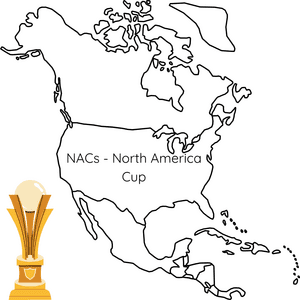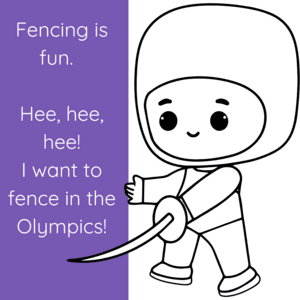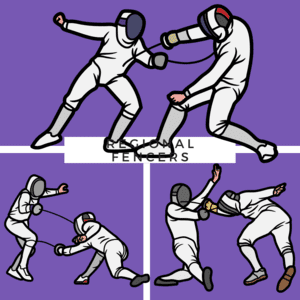The Levels of fencing: ① Beginning Fencers ② Local Fencers ③ Regional Fencers ④ National Fencers ⑤ International Fencers ⑥ Olympic/Top International Fencers
The Levels of Fencing
Every fencer who has stayed in the sport has at some point realized that the various skill levels of fencing are far FAR greater than they initially thought. For me, this came as quite a shock. You see, I was one of those kids who thought I was hot…stuff…when I was a new fencer. I had taken some classes at my local club when I was around 12 and had dropped out after a few months (at the time, I wasn’t looking to be as competitive as they wanted to be there), only to pick it back up again when I was a Freshman in high school through a Youth Enrichment League led Community Ed program.
At the time, YEL would run beginner tournaments on a regular basis, and they were pretty big, usually getting over 100+ participants. When I went to my first one, I got first place. Huh, maybe I am pretty amazing? A few months later, I went to my second one. First again. Woah, I am pretty good, I thought to myself. I did that for about a year and a half.
Was I proud to be this amazing? You bet. Did I have fantasies about being the best sword fighter ever to have ever lived? 100 percent. Did I tell a girl I had a crush on at the time that I might make the Olympic team? Of course.

Do I look back on all of this and experience the most intense feeling of cringe imaginable? Oh goodness, yes. Yes, I do.
Like a lot of new fencers, my idea of fencing came from movies, TV shows, books, and once every four years, if I caught it on the Olympics. For me, this beginner tournament I would go to was the only thing I knew about apart from the Olympics. I assumed they had to be close in level.
The hammer came down when I went to a local club for the first time after deciding I should train more days a week if I wanted to go to the Olympics. Maybe. I was clearly one of the most epic fencers ever and was quite excited to grace these other fencers with my excellent skills.
First bout against an “older lady”. “No problem.”
In the first bout, I fenced an older lady, maybe early 50s. “No problem.”, I thought as I got en grade. “I should probably take it easy on her.”, but then…. I was absolutely destroyed. 5-0. Blam, blam, blam, blam and BLAM. It was effortless, and I had no defense against either her attacks or her defensive actions.
HUH? But wait, Olympic prospects like me don’t get wrecked by old ladies! Clearly, she was just so experienced (Yoda in disguise, possibly) that I had no shot; I had only fenced for a year or so. Not my fault? Right? So, I got another bout. I was around 16 or 17 at the time, and my next bout was against a fencer who was probably 12 or 13, and again, I figured this would be pretty easy. If I had been paying attention better, I might have noticed that the coach, who could clearly see I was FAR too cocky to be allowed, had called this fencer over specifically to fence me, and instead of patrolling the class as he had been doing, stopped to watch what was about to unfold with a slight smirk on his face. To no one’s surprise but mine, I got crushed even harder than my first bout.
Getting crushed was my first introduction to the different levels of Fencing, and while when you are a beginner it can feel like you are the best fencer ever the reality is more like this:

That can be a pretty intense realization for a new fencer. It’s ok though, because everyone starts somewhere and as long as you keep focused and work hard you can quickly start moving up through these levels yourself. But enough about me being dumb; let’s talk about these levels and who and what categorizes these fencers. Two quick notes before we get started here;
- all of these levels blend together to some extent, someone can be a great local fencer and also a decent regional fencer and a lot of the top national level fencers are also usually international fencers as well.
- This is written by someone who is from Minnesota and lives in the USA; it may be different for different areas of the country.
Beginner Level of Fencing
This group is made up of people who have usually been fencing in very relaxed settings like a community education class and practice usually just one day a week. Their coach will usually not be giving people private lessons, and if they do any competition, it will be one within the class itself or a beginner one with other beginner athletes. These fencers will usually only know a little of the specific terminology of fencing and will have a very shaky idea of concepts like right of way and whose turn it is to attack. Their coaches usually do not have the most up-to-date information on fencing or know about a lot of the higher-level concepts as they are close to beginner fencers themselves. Beginners are also the most likely to have an overinflated idea of themselves as they have the least access to the rest of the athletes in the sport, and they have the narrowest perspective.
Beginner level to Local Level is also the single most jarring jump in the sport because all of the rest of the levels know and have access to each other, and when a Beginner fencer joins a club to start their fencing journey, they will be introduced to a lot of different levels right away usually all at once. Once you get over this initial shock and stick with the sport, though, things can start to get really fun.
See, beginners don’t really get a chance to develop their set of moves very much because they don’t come to practice enough, and when they are there, they don’t get to fence against other athletes that are more skilled; they usually only work on the most basic of actions. They don’t know it, but those are also the most boring, and fencing gets way WAY more exciting once you start to develop higher-level skills.
Local Level of Fencing
Local fencers are a curious bunch. A lot of these fall into two different camps:
- Older, more relaxed fencers who do the sport recreationally to hang out but used to be higher-level fencers.
- Newer fencers who are just developing past the beginner level are not traveling for fencing yet but are doing regular local competitions.
Let’s talk about group one first. This actually covers a very broad base of skill because (take it from me) just because older fencers are doing the sport recreationally does not mean they are bad fencers. They can be very, VERY skilled. In fact, the craziest bout I ever saw in person was a saber match between a coach who had been convinced by his students to do a Regional tournament because it was close to their club and one of the top saber fencers in the world, Ziad Elssisy (he just got 4th at the Olympics in Paris by the way) who for reasons unknown also decided to fence a Midwest regional. This coach hadn’t been training for competition, he was focused on his athletes and maybe put on his gear occasionally at practice. Their bout went to 15-14, and by the end of it, the entire venue, of probably close to 300 people, had gathered around to watch it. It was wild! Elssisy won in the end, but it was a close match.
This first group of Local fencers are fantastic to have around and compete with because they can give much experience to other members of the club, and they are great training partners because they ARE beatable, but you need to refine your skill to a certain amount in order to do so. They are sort of like an early boss battle in a video game (yes, I am still a nerd at heart) where when you FINALLY develop your skills enough to beat them, it feels so great, but then in a year or two, you realize you can crush them easily, it just felt hard at the time.
Now, the second group is different. Most of the fencers here are new fencers who are just starting to get more involved in the sport. They are usually messy in their technique, but they are beginning to develop the basic skills and understanding of the sport. This group will usually be taking one to two private lessons a week from a coach and will get out to local competitions when there is one available. They usually develop a basic outline of what will become a more refined style, but it has a way to go. As local fencers start to get their style a little more leveled
They will start going to regional tournaments, too, so you will run into these people at that level of competition, too. Their distance understanding is there, but it is usually not refined and is not well used.
 Regional Level of Fencing
Regional Level of Fencing
Your average regional fencers are a lot more competitive than local fencers are. They travel more, and they fence other regional-level fencers more consistently and in a more official setting, so it refines and sharpens their skills and abilities in a way that someone who has done only local and beginner tournaments won’t really be able to understand, but once they do a regional, they will know exactly what I am talking about. These fencers usually have a more defined style and have developed a set of a few decent actions with which they can consistently score. They will usually take 2-3 lessons a week with a coach and come to practice 3-5 times a week. They are also far better at controlling the distance of actions and using it to their advantage. This group is where the old saying “amateurs practice until they can get something right, professionals practice until they can’t do it wrong” starts to come into play. These fencers will usually have one or two actions that they are very skilled at and will consistently use well in bouts against almost any level of fencer.
Regional tournaments and, thus, regional fencers have the broadest skill levels in terms of the top and bottom. You can go to a decent-sized regional, and you will see people who are basically new, just getting to their first serious tournament, all the way up to some fencers who are among the best in the world. It’s a very strange and cool part of our sport that the top and the bottom are so accessible to each other.
You could attend your first regional as a 13-year-old and have someone like Jeidus Deseranno in your pool, who finished 2nd place at the Cadet WORLD CHAMPIONSHIPS. The equivalent in other sports would be a bottom-finishing high school football team having an official game against an NFL team. This is what makes regionals such a good training ground for fencers, though, because when you go to one, even as a beginner, there will be people your level, people just above your level, people way above your level, and people who are just astronomically better and you can watch them all compete and see what everyone does to try to win against these different matchups. Because of this, regional fencers also tend to grow their styles and accelerate the fastest.
National Fencers
National tournaments or NACs (North American Cups) are where tournaments start to get really hard consistently. They are basically a super uber duper charged Regional tournament with 300 people in an event instead of 50. NACs are like if you took all of the middle to top regional fencers from around the country, scratched that bottom group of newer fencers I was talking about, and then added in International fencers who don’t bother with regionals. Tough stuff. This makes for some tough competitions, and the fencers who attend Nationals consistently are usually very, very skilled because, just like with regional fencers, when you regularly compete at this level, you HAVE to refine your style, reaction times, quick processing, and technique to an even higher degree. It is the exact same way regionals polish your skills, just far more intensely.
They are basically a super uber duper charged Regional tournament with 300 people in an event instead of 50. NACs are like if you took all of the middle to top regional fencers from around the country, scratched that bottom group of newer fencers I was talking about, and then added in International fencers who don’t bother with regionals. Tough stuff. This makes for some tough competitions, and the fencers who attend Nationals consistently are usually very, very skilled because, just like with regional fencers, when you regularly compete at this level, you HAVE to refine your style, reaction times, quick processing, and technique to an even higher degree. It is the exact same way regionals polish your skills, just far more intensely.
Your average fencer at this level is usually very comfortable with their style. They will know what their body can do and how to get the most out of it, and they will have a plethora of different tools and skills that they can pull out to deal with a larger variety of actions. To enable this they are usually getting 3-5 private lessons a week with their coaches and are attending practice 4-6 times. They will know how to control the distance and set it up to where they want it to be to score their actions. They WILL be paying attention to what their opponent is doing and coming up with a strategy to deal with it, as well as adjusting their distance to maximize those actions and mitigate the actions of their opponent. They will also be noticeably smoother and more confident in their actions than your average regional fencer, and they will execute their actions very quickly. These folks will have a lot more actions on the “you can’t get it wrong” side of the quote I included earlier than regional-level fencers.
International Fencers
So here we are, almost at the top of Mt. Fencing. The fencers at this level are the crème de la crème of the WORLD. Reader, please think back to the start of this article and consider all the various levels of fencer we have discussed from the bottom to the top.
To qualify for an international competition for the US team, like a World Cup or Grand Prix, an athlete needs to be one of the top 8 fencers in the country (in Division 1, which is ages 13 and up, and you need to have a C rating or higher) who is available to go to a competition. All of the participating countries can send up to 8 athletes. So when you think about the level of competition, realize that all of that craziness I said with the NACs and what those fencers are like in terms of skill, take the top 8 of that group, which is made up of the top 2-300 of the regional fencers all around the country and that’s who goes to this level of competition and EVERY OTHER COUNTRY DOES THAT TOO.
So it goes without saying that these tournaments are absolutely insane, and the fencers who compete in them are even crazier. These athletes have perfect body control and control of the actions they are setting up, and they can get their bodies and blades to do some genuinely mind-bending things. But listen, there are NAC fencers and even some decent regional fencers who can do some crazy stuff; what sets these fencers apart is this:
- They have a truly perfect sense of their own distance and how to control it.
- They have refined their style and skills to a point where they will either have an action for almost any scenario that can beat what their opponent is doing or be able to create the scenarios that are ideal for them to score.
Confidence is the biggest thing in this group. You will very often see a fencer who is relatively unknown or low-rated, who will have a result at a major tournament, and then all of a sudden, in like a day, they just never really do poorly again and shoot to the top of the ratings. Their style hasn’t changed, but their confidence and knowledge of what they can do have.
Olympic Fencers/Top International
So here is the dirty little secret about the Olympics in terms of the fencing at the tournament. While it is probably the most challenging tournament in fencing, it’s actually, in terms of who is going, a pretty easy tournament because of how the qualification paths work. It isn’t just the top fencers (though a lot of them end up there). It is people from all over the world, so there are plenty of people who make it to the Olympics that, uh, shall we say, if it were just a competition of the top 32 fencers in the world would not make it to the Olympics? That sounds nice. Let’s go with that. No, what makes the Olympics the most brutal fencing tournament is that it is by far the most MENTALLY challenging tournament there is in terms of the pressure and intensity of the competition.
We are talking about US Fencing, though, and their Olympic fencers ARE crazily skilled and amongst the best in the world. To make the team in the United States, you need to be one of the top 3 in the country as determined by points. The most points come from International Competitions, so basically, to make the US team, take those top 8 from the International group, cut it down to 3, and that’s who goes. And fencers build these points up over YEARS, so it takes a long series of consistent performances to make it. I remember the first time I ever saw one of the Olympians fence in person. I had been to previous NACs, so I thought I understood what the best thing was. I don’t even remember who it was that was fencing, but I remember the score between this person, who was a fantastic NAC fencer, versus Gerek Meinhardt, one of the USA team Olympic members. It was 15-4, and it was done in one period. Meinhardt barely even looked like he was sweating, and then the other fencer’s mom asked for a picture of the two together before they unhooked. Very cute.
The thing is, with the top fencers in the world who usually have been there for a while, they are really playing for just the barest EDGE of an advantage over each other because everyone at the international level is close enough in skill level to beat each other. Usually the separator is that level of confidence and self-belief from the fencers who know they can win because they have done it before.
Confidence is the biggest separator in this group compared to the “average” international fencer. You will very often see a fencer who is relatively unknown or low-rated on the points list, and they will have a nowhere result at a major tournament, and then all of a sudden, in like a day, they just never really do poorly again and shoot to the top of the ratings. Their style hasn’t changed, but their confidence in their execution and knowledge of what they can do has.
It is OK to NOT be an Olympian
I hope this helps shed a little light for those who didn’t quite understand the levels of fencing before. To make it to being an Olympic Fencer is one of the most challenging things a fencer can achieve and it comes from incredible amounts of dedication, time focus and let’s face it, money. 98% of fencers are never even going to be international team members for the USA. And here is the thing, that’s OK.
A fencer’s main priority should be developing their own fencing style and having fun with the sport. Yes, you can and should push yourself, and yes, you can and should do tournaments, but you should take your fencing journey one step at a time and ENJOY it. To me as a coach, I don’t care if a fencer prefers to be a local fencer and never wants to engage beyond a local tournament or if they push themselves to perform at a national level and travel all around the country.
Now, of course, I am going to push them and try and get the most out of everyone, but I love all of my fencers, whether they are some of the top in the region or the country or brand new first day with a blade beginners. Everyone is different, and no one group is better or more of a fencer than another. Fencers will finish their career or time in this sport all across the level spectrum whether they try it for the first time in a beginner class and decide it wasn’t for them or if they make it all the way up to the top of Mount Fencing and have the honor to be an international fencer. As a coach and as far as I am concerned, no matter where your fencing career takes you, remember these words by Duke Leto Atreides from Dune:
“You’ll still be the only thing I have ever wanted you to be.” For me, that means being a fencer.




 Regional Level of Fencing
Regional Level of Fencing

